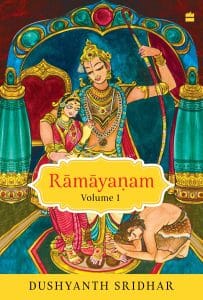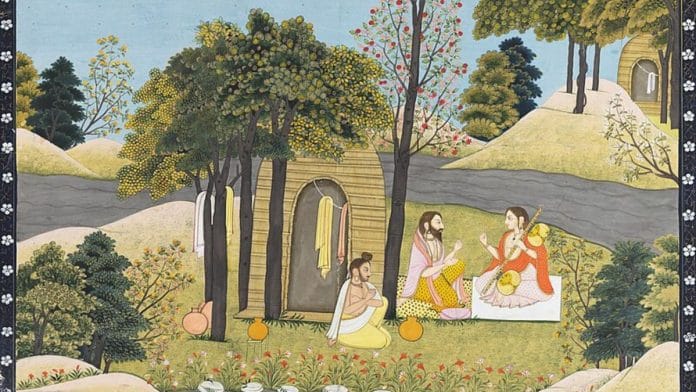With immense satisfaction, Vālmīki walked along the Tamasā with his śiṣya Bharadvāja beside him, enjoying nature’s scenic beauty. He saw a pair of birds on a tree, making love.
Bharadvāja asked, ‘O ṛṣi! Can you please tell me about these birds?’ Vālmīki patted Bharadvāja on the back and said, ‘I am fortunate to have a śiṣya like you, who is vigilant and inquisitive. These are the krauñca birds which live together. Even while sleeping, the female rests her beak between the mandibles of the male. If they are separated even for a moment, they keep calling to the other for union, and die if the partner is late. That call of the bird hurts any lover undergoing separation.’
Suddenly, he saw the red-headed male krauñca bird fall from the branch of the tree with a wail. Hit by an arrow, he was bleeding profusely. The female bird cried aloud and this separation during their love play caused severe anguish to Vālmīki. The sorrow coupled with anger aroused severe emotions in him. He choked and as the sorrow made its way through his throat, it was transformed into letters.
In all, thirty-two letters reached the tip of his tongue and he uttered, ‘O niṣāda, who awaits calamity very soon, your unworthy attitude was seen when you shot and killed one of the birds while they were making love. As a result, you shall be eternally unhappy.’ A furious Vālmīki walked away with Bharadvāja.
After a few yards, he spoke in a melancholic tone, ‘I shouldn’t have uttered such words of hate. He is a niṣāda and has only done his daily work. I should have exercised caution and restraint, and desisted from making such hateful pronunciations on the poor man.’
He asked Bharadvāja to quickly check if the niṣāda had left and to his dismay, the śiṣya exclaimed, ‘Ṛṣi, I don’t see the niṣāda, or the birds.’
Vālmīki said, ‘I am not surprised now. Did you notice while I spoke, the letters were numbered, and the lines flowed in a rhythm? Each part had eight letters, and, in all, the verse had thirty-two. I have heard my ācārya say that this format is the anuṣṭup metre, one of the seven reins that hold the horses of Sūrya’s chariot. I am sure there is something more to this incident, but I am unable to decipher what it means. Hope I get a stalwart to reveal the purport.’
The duo traced their path to the āśrama with an obedient Bharadvāja contemplating on his ācārya’s composition while carrying a pot filled with water on his shoulder.
They entered to find Bramhā seated on a wooden plank lined with a thin layer of darbha grass and a haṃsa seated by his feet. The unexpected arrival of Nārada earlier and Bramhā now, coupled with the hunting incident, confused Vālmīki. He instantly prostrated at Bramhā’s feet. Like a tortoise that keeps its limbs concealed, so did Vālmīki keep his mind, senses and heart under control. He sat on the floor in utmost humility after doing a pradakṣiṇā around Bramhā.
Bramhā said, ‘After Rāvaṇa’s death and the subsequent paṭṭābhiṣeka of Rāma, I was asked by Rāma to have his biography written in verse. It was to be a poem which, on reading, would ignite in the reader the urge to seek mokṣa.
‘A rākṣasa called Śaṅkukarṇa, also known as Akampana, escaped from the hands of Rāma during the battle at Janasthāna. He reared a male krauñca bird that was traumatizing the travellers in the forest. A niṣāda, immensely blessed by Rāma, came into the scene. The niṣāda killed the rākṣasa in front of your eyes and received the curse in return.’
Vālmīki interposed, ‘Have I cursed the scion of Sūrya vaṃśa? I couldn’t have been crueller.’
Bramhā smilingly remarked, ‘Do not worry. Your uttering was not a curse, but a blessing. You said, “O consort of Lakṣmī! You have separated Rāvaṇa, who had indecent intentions towards Sītā, from his consort Mandodarī, even as they were making love. You shall remain blessed and for years together live in fame and prosperity.”
‘This, indeed, was a benediction on Rāma through the niṣāda. My son, Nārada, using the nuances of grammar, interpreted your uttering thus, “O rājā of Lanka, who is adorned with the red crown, you have separated Rāma from Sītā, who is virtue personified, while they were together. This act of yours is condemnable and this shall become the theme of a work that will be unparalleled in religious literature.”
‘But I see this verse of yours as a condensed form of the work you will be writing. It goes like this, “O consort of Lakṣmī! You shall live for years together and your fame will be eternal. You had forsaken your rājya to keep your father’s promise and left for the woods for fourteen years. You freed the ṛṣis of their fears by defeating the rākṣasas and you relieved Sugrīva of his cunning brother Vāli. You rescued Sītā from Rāvaṇa’s clutches and forsook her to uphold the duties of an unbiased rājā.”’
Also read: ‘Yaksha Prashna’ of Mahabharata has lessons for modern-day CEOs
A Blessed Poet and His Epic Task
Bramhā looked at a petrified Vālmīki, who said, ‘O Bramhā! The most respected one! What should I do?’
Bramhā replied, ‘You need to write the biography of Rāma in great detail, omitting nothing. I shall bless you with the ability to see every incident in Rāma’s life as if you were seeing it in person. No word of yours shall be untrue. As long as the mountains survive and the rivers flow, your work shall exist. And only as long as your work exists, the mountains and rivers shall remain.’
Vālmīki was overwhelmed and asked, ‘Sir! What should I call this work?’ Bramhā thought for a while and said, ‘You are writing of the scion of Sūrya vaṃśa. Just as Sūrya’s rays travel northwards during uttarāyaṇa and southwards during dakṣiṇāyana, the path traced by Rāma, his descendants shall be Rāmāyaṇa.’
Vālmīki repeated the name with deep fervour, ‘Rāma of Rāmāyaṇa. Rāma in Rāmāyaṇa. Rāmāyaṇa. Sounds beautiful.’
 This excerpt from ‘Ramayanam: Volume 1’ by Dushyanth Sridhar has been published with permission from HarperCollins India.
This excerpt from ‘Ramayanam: Volume 1’ by Dushyanth Sridhar has been published with permission from HarperCollins India.






